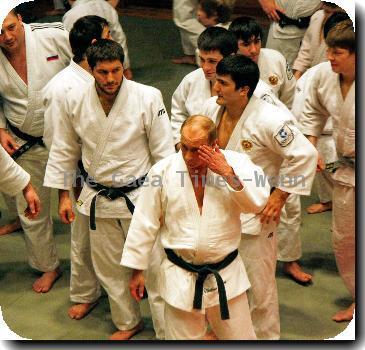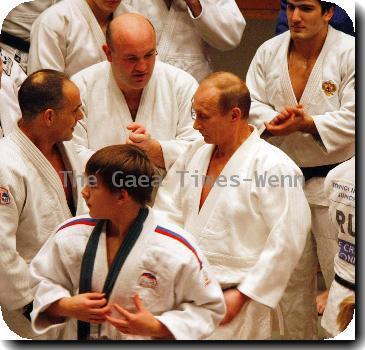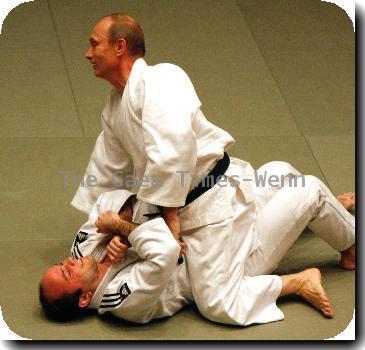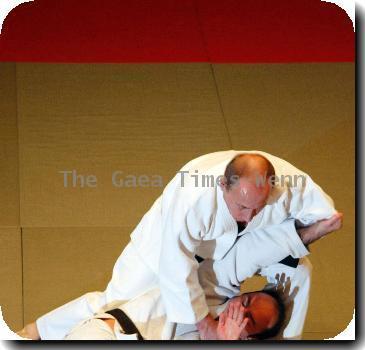Polish president’s body returned to Warsaw; met by his twin brother, daughter
By Vladimir Isachenkov, APSunday, April 11, 2010
Polish president’s body returns to Warsaw
WARSAW, Poland — Tens of thousands of Poles softly sang the national anthem and tossed flowers at the hearse carrying the body of President Lech Kaczynski to the presidential palace on Sunday after it was returned from Russia, where he and dozens of political, military and religious leaders were killed in a plane crash.
The plane carrying Kaczynski’s body arrived from the Smolensk airport, where he and 95 others had been heading Saturday to honor 22,000 Polish officers slain by the Soviet secret police in 1940 in the western Soviet Union.
The coffin bearing Kaczynski’s remains were met first by his daughter Marta, whose mother Maria also perished in the crash. She knelt before it, her forehead resting on the coffin.
She was followed by Jaroslaw Kaczynski, the former prime minister, and the president’s twin brother. He, too, knelt and pressed his head against the flag-draped coffin before rising slowly and crossing himself.
Standing sentinel were four Polish troopers bearing sabers.
There was no sign of the twins’ ailing mother Jadwiga, who has been hospitalized. The president had canceled several foreign trips lately to be by her side.
The coffin was placed aboard a Mercedes-Benz hearse and slowly traveled several miles to the palace, watched by thousands of weeping Poles.
Earlier, the country held two minutes of silence in memorial for those killed in the crash.
Church bells pealed at noon and emergency sirens shrieked for nearly a minute before fading. Hundreds bowed their heads, eyes closed, in front of the presidential palace. Buses and trams halted in the streets.
No date for a funeral has been set and the presidential palace has not yet said if Kaczynski will lie in state.
The death of the president and much of the state and defense establishment in Russia, en route to commemorating one of the saddest events in the neighboring nations’ long, complicated history, was laden with tragic irony.
“He taught Poles how to respect our traditions, how to fight for our dignity, and he made he made his sacrifice there at that tragic place,” said mourner Boguslaw Staron, 70.
Among the dead were Poland’s army chief of staff, the navy chief commander, and heads of the air and land forces. At the Field Cathedral of the Polish Army in Warsaw, hundreds gathered for a morning Mass and left flowers and written condolences. Government spokesman Pawel Gras said the country’s armed forces and state offices were operating normally despite the devastating losses.
Michal Boni, an official in the prime minister’s office, said they remained in constant contact with deputy head of the National Bank of Poland, Piotr Wiesiolek.
He said the bank’s Monetary Policy Council will hold a meeting on Monday, as previously planned.
“We are prepared to take various decisions, but we do not see that anything dangerous could happen in the economy,” Boni said. The economy has so far managed to avoid recession.
The acting president, Parliament Speaker Bronislaw Komorowski, said he would call for early elections within 14 days, in line with the constitution. The vote must be held within another 60 days.
Kaczynski had indicated he would seek a second term in presidential elections this fall but was expected to face an uphill struggle against Komorowski and his governing party, the moderate, pro-business Civic Platform. Kaczynski’s nationalist conservative Law and Justice Party could benefit, however, from the support of a country mourning the loss of their president, particularly with elections now set to take place by late June.
In Moscow, Russia’s transport ministry said that Russian and Polish investigators had begun to decipher flight data recorders of the aging Soviet-built Tu-154 airliner that crashed while trying to land in deep fog in Smolensk.
Russian officials had said 97 people were killed but revised the figure to 96. Poland’s Foreign Ministry also confirmed the figure.
The Smolensk regional government said Russian dispatchers had asked the Polish crew to divert from the military airport there because of the fog and land instead in Moscow or Minsk, the capital of neighboring Belarus.
Former president, Solidarity founder and Nobel Peace Prize laureate Lech Walesa, said it was too soon to cast blame.
“Someone must have been taking decisions on that plane. I don’t believe that the pilot took decisions single-handedly,” he told reporters. “That’s not possible. I have flown a lot and whenever there were doubts, they always came to the leaders and asked for a decision, and based on that, pilots took decisions. Sometimes the decision was against the leader’s instructions.”
Polish-Russian relations had been improving recently after being poisoned for decades over the slaying of some 22,000 officers and others in Katyn forest and in other areas. About 4,000 Polish army officers were killed in the forest by Josef Stalin’s NKVD, the forerunner to the KGB, in 1940
Russia never has formally apologized for the murders but Russian Prime Minister Vladimir Putin’s decision to attend a memorial ceremony earlier this week in the forest was seen as a gesture of goodwill toward reconciliation. Kaczynski wasn’t invited to that event because Putin, as prime minister, had invited his Polish counterpart, Donald Tusk.
Kaczynski, 60, was the first serving Polish leader to die since exiled World War II-era leader Gen. Wladyslaw Sikorski was killed in a mysterious plane crash off Gibraltar in 1943.
Kaczynski’s twin brother flew to Smolensk on Saturday evening and identified the body of his brother and sister-in-law.
In Warsaw’s historic center, large sections of the street were blocked to traffic to allow the flow of people expressing their grief. Mourners carried candles and roses and joined a long line to sign a book of condolences in the palace.
Also aboard the plane were the national bank president, the deputy foreign minister, the army chaplain, the head of the National Security Office, the deputy parliament speaker, the Olympic Committee head, the civil rights commissioner and at least two presidential aides and three lawmakers.
Some on board were relatives of the officers slain in the Katyn massacre. Also among the victims was Anna Walentynowicz, whose firing in August 1980 from the Lenin Shipyards in Gdansk sparked a workers’ strike that spurred the eventual creation of the Solidarity freedom movement.
Walesa was among those who signed a condolence book in Gdansk.
“The elite of our country has perished,” he said the day before.
Children also placed simple drawings and messages of mourning: “I love our president,” said one, alongside a picture of a human figure and a cross.
Polish television carried black-and-white montages of those killed in the crash and devoted nonstop coverage to the crash, including lingering looks at Kaczynski and his wife, Maria.
President Dmitry Medvedev declared Monday a day of mourning in Russia.
The Tu-154 was the workhorse of Eastern Bloc civil aviation in the 1970s and 1980s. Poland has long discussed replacing the planes that carry the country’s leaders but said it lacked the funds.
According to the Aviation Safety Network, there have been 66 crashes involving Tu-154s in the past four decades, including six in the past five years. The Russian carrier Aeroflot recently withdrew its Tu-154 fleet from service, largely because the planes do not meet international noise restrictions and use too much fuel.
The Polish presidential plane was fully overhauled in December, the general director of the Aviakor aviation maintenance plant in Samara, Russia, told Rossiya-24. The plant repaired the plane’s three engines, retrofitted electronic and navigation equipment and updated the interior, Alexei Gusev said. He said there could be no doubts that the plane was flightworthy.
Isachenkov reported from Moscow. Associated Press Writers Vanessa Gera and Matt Moore in Warsaw and Victoria Buravchenko in Smolensk, Russia contributed to this report.
On the Net:
www.president.pl/en/
Tags: Accidents, Eastern Europe, Europe, Funerals And Memorial Services, Gdansk, Moscow, Poland, Russia, State Funerals, Transportation, Vladimir Putin, Warsaw



